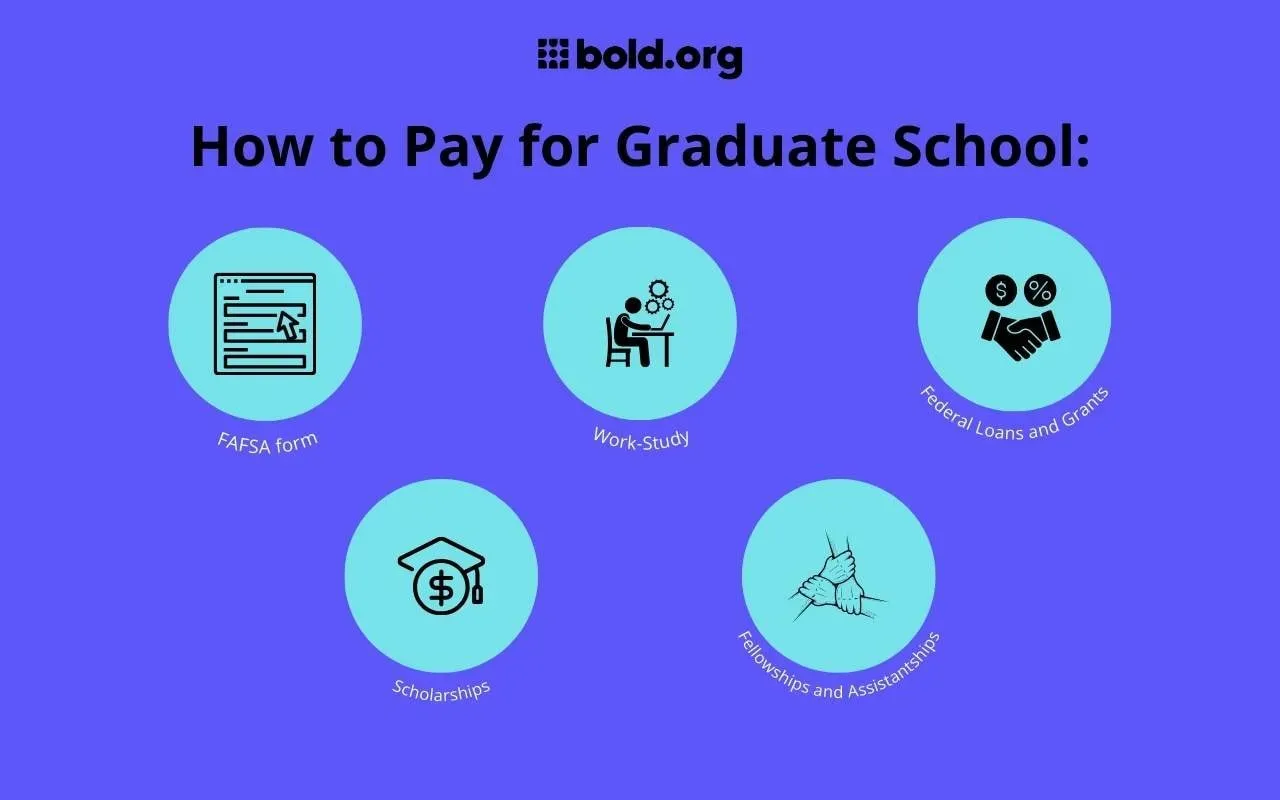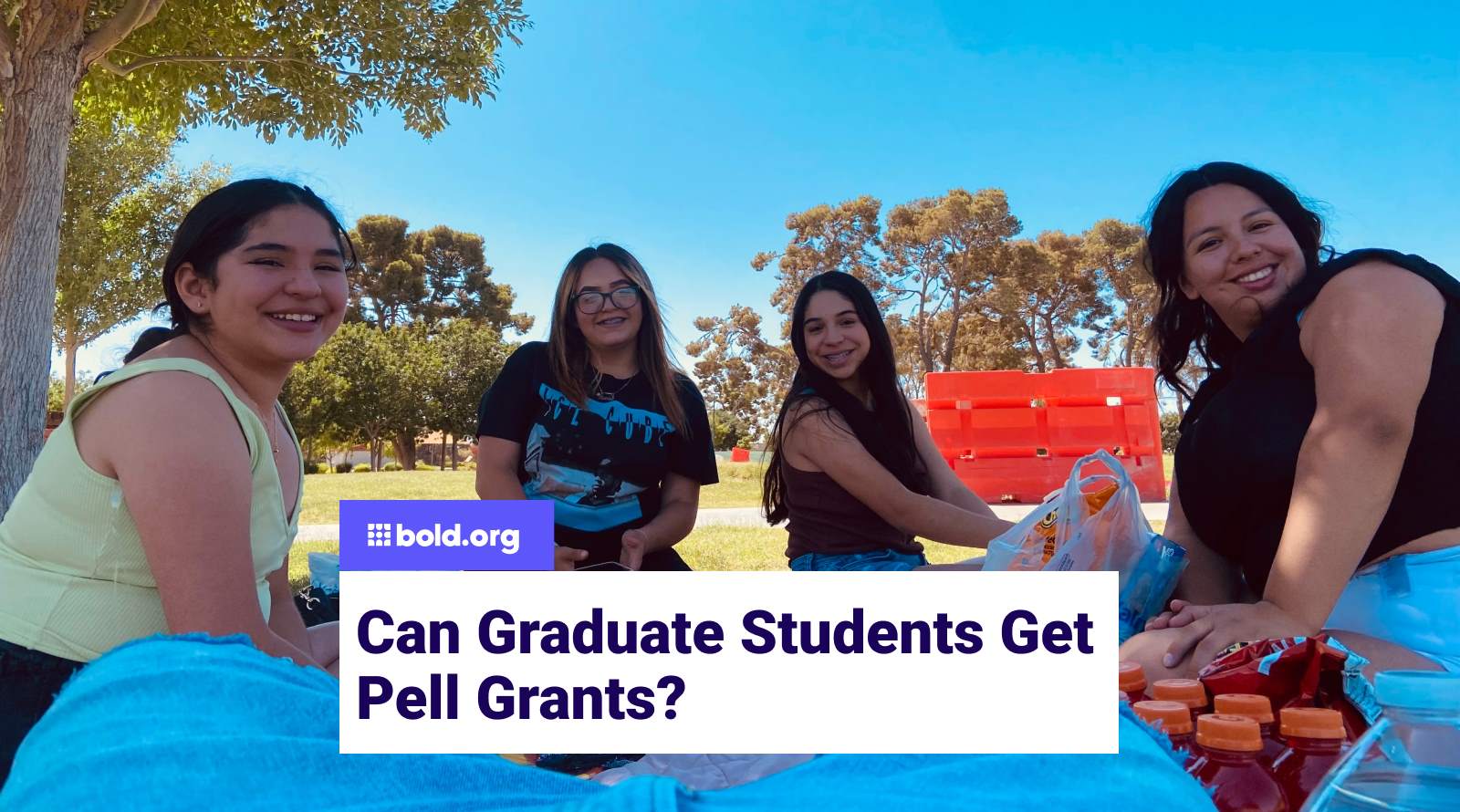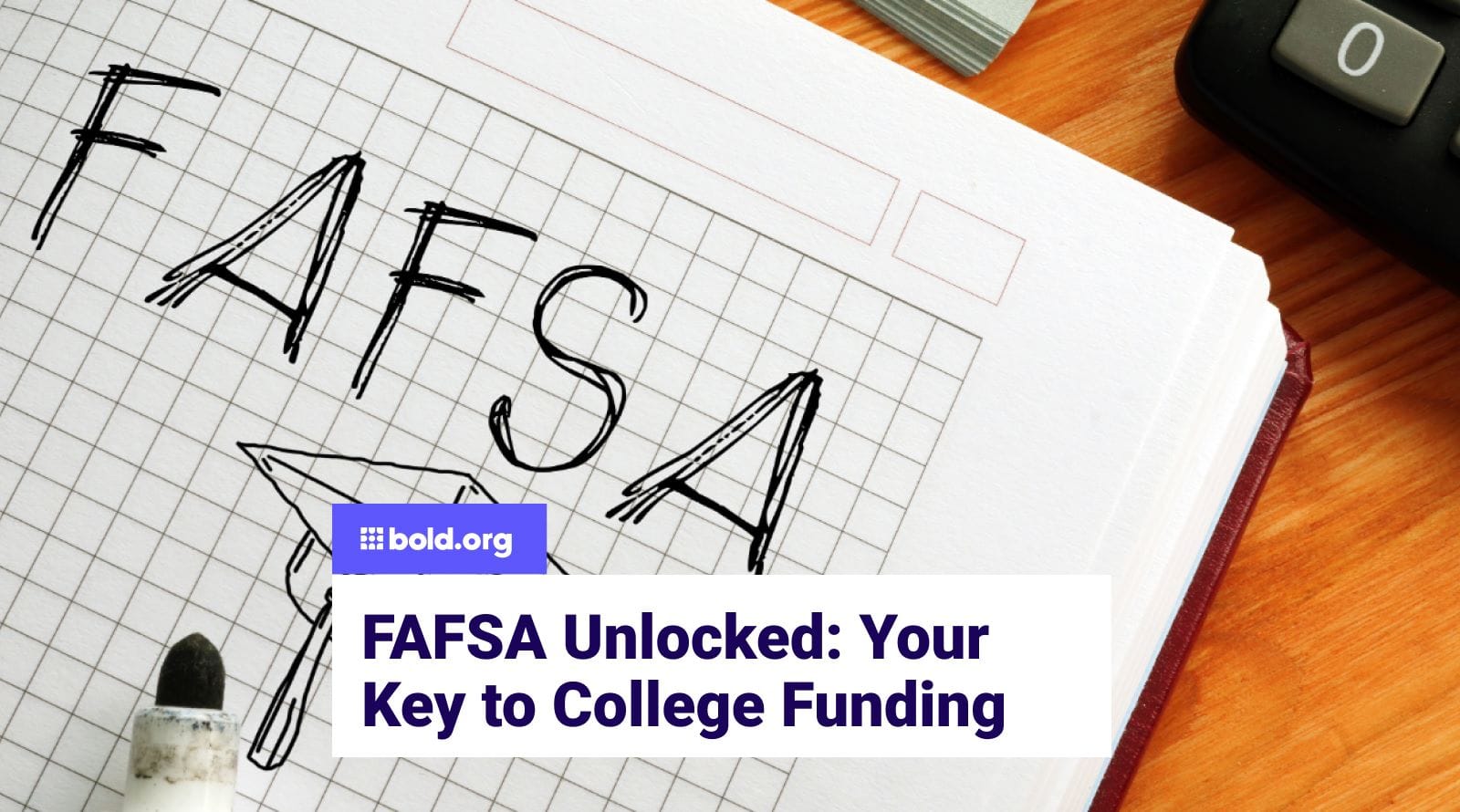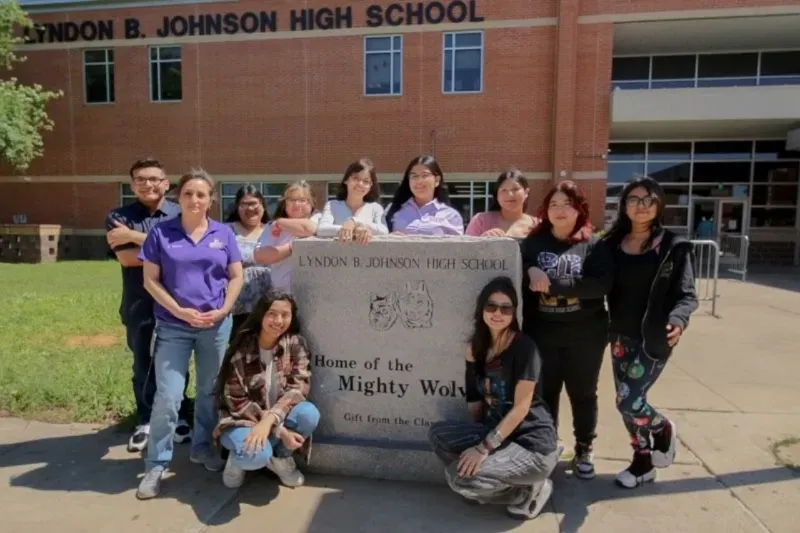Does FAFSA Cover Graduate School? Your Financial Aid Guide


Are you dreaming about graduate school but unsure how to manage the costs? The first step towards earning your master's degree is filling out the FAFSA form. FAFSA and external scholarships can help with the financial burden graduate students can experience and help them get financial support for grad school.
Many students don't realize how financial aid options change after completing a bachelor's degree. Understanding these changes is important for anyone thinking about returning to school. This article will equip you with the knowledge to navigate the graduate world and answer the question: "Does FAFSA Cover Graduate School?"
We’ll dive into why pursuing a graduate degree is a beneficial life choice and explain how Bold.org can assist you in making informed decisions about grad school and finding additional financial aid resources.
Find scholarships in minutes! Sign up for your free Bold.org profile and get matched with eligible scholarships.

Understanding Federal Student Aid for Graduate Students
The Free Application for Federal Student Aid (FAFSA) is a form created by the U.S. federal government to understand students' economic status and decide eligibility for financial aid, including student loans, scholarships, grants, and work-study that each student can receive. The form has been available to help students in the U.S. achieve higher education; however, as students progress in their educational status, slight differences may occur in their FAFSA application.
Graduate students are still eligible to fill out the FAFSA when considering graduate school. However, despite the government's efforts to provide students in the United States with access to education, financial aid amounts can decrease for various reasons.
Create Your Free Profile to Apply for Scholarships Today!How Does FAFSA Work for Graduate Students?
Students attending an accredited school can fill out the FAFSA form and are encouraged to do so as soon as possible, according to the college's priorities and deadlines.
The main difference between filling out the FAFSA as an undergraduate and a graduate student is age. Therefore, students who have either finished their bachelor's degree or are older than 24 are considered independent and are likely to receive less financial aid.
Who Is Eligible for Federal Student Aid As a Graduate Student?
Graduate school applicants are only eligible for federal financial aid and graduate scholarships if they meet specific requirements:
- Demonstrate financial need based on their FAFSA information.
- Be a U.S. citizen or eligible noncitizen.
- Attend an institution that offers an eligible degree or certification program.
- Be enrolled as a regular student as defined by the institution.

Types of Financial Aid for Graduate School
After filling out the FAFSA form, you are ready for the next steps of the financial aid package funding your Master's degree. However, it's crucial to be aware of the federal aid resources available to help your educational dreams come true. Here are some of the many financial aid opportunities available for graduate students:
Federal Work-Study Programs
A great option to fund your graduate school is applying for federal financial aid opportunities and work-study jobs. These jobs can be on and off campus, offering diverse opportunities for grad students to work while studying. The jobs on campus can be in libraries or the universities' gym, whereas off campus can be a non-profit connected to the university you are part of.
In addition to helping you fund living expenses during your graduate school, work-study jobs can also be an opportunity to gain professional experience and learn new work skills. In some universities, you can work in a lab conducting research in a field of your interest with highly skilled professors and Ph.D. students or even take administrative roles by helping the organization of some sectors of the graduate school.
Federal Student Loans
Federal student loans are always a great aid for receiving graduate student loans since they offer advantages compared to private student loans, and the interest rates are pretty flexible to pay. Some of the advantages are:
- Meanwhile, students who want to take private student loans need to provide their credit history; students applying for Federal loans don't need to provide a credit history to be eligible to receive federal financial aid.
- Federal student loans have fixed rates, which means that if you take a federal student loan with a 2.75% interest rate, it will remain at that rate until you pay off all your debt.
- Students have a repayment grace period, meaning they have a 6-month period after leaving college to start paying their loans.
- Citizens facing harsh economic times are eligible to apply for forbearance or deferment postponement, which allows them to postpone the payment of federal student loans.
- The payments requested are income-driven, meaning you will pay a fair price according to your salary.
- People with at least ten years of work service may be eligible for loan forgiveness.
The federal student loans available for graduate students are:
- Direct unsubsidized loans are available for undergraduate, graduate, and professional students, and students can receive up to $20,500.
- Direct PLUS Loans are available for parents borrowing money for their dependents and eligible graduate and professional students. The maximum amount received is the cost of tuition minus the aid students receive.

Federal Grants
Federal grants are other resources that can be provided to students who fill out the FAFSA form. The grants are available to students from community colleges to career schools. The great advantage is that students who receive grants will not have to repay them, so take advantage of this resource; it is a free application that can help your graduate education.
Graduate students who have finished their bachelor's or master's degree are less likely to receive a grant since the Federal Pell Grant and the Federal Supplemental Educational Opportunity Grants (FSEOG) prioritize undergraduate students. However, the Teacher Education Assistance for College and Higher Education (TEACH) Grants can still be a great option for graduate students.
Here are some of the requirements for the TEACH grant:
- To receive the grant, the students must agree to complete the teaching program in which they have volunteered. If the student decides to leave the program, the grant will be converted to a federal loan.
- Be enrolled in a school that is part of the TEACH program.
- Maintain required academic progress.
- Send your federal taxes to FAFSA.
- Provide documentation and state that you do not own loans to the federal government and will use the funds for educational purposes.
In addition to the requirements for graduate scholarships as above, students who become part of the TEACH program will agree to teach full-time for four years in a school or agency that serves low-income students, teach in a high-need field, and complete the four years of teaching within eight years of graduation. Students who complete all requirements will receive a grant of $4,000.

Scholarships for Graduate Students
Scholarships are financial funds given to students as merit-based budgets to help them pay for their graduate school program. As undergraduate programs, graduate programs can also have scholarships.
Apply for graduate student scholarships today to supplement your other financial aid packages!
The best way to get financial aid and find out about scholarships is to use a search engine and look at a database of websites such as Bold.org, institutional scholarships, and local scholarships. Here is a summary of each one of these and additional funding options:
- Bold.org is a website that offers a wide range of scholarships to students from various backgrounds. The company believes in inclusivity and wants to promote education to all deserving students by making the scholarship process user-friendly. The great advantage is that students can find a wide range of monetary opportunities on one website instead of doing extensive research through numerous options.
- Check out merit scholarships and no-essay scholarships! Other types of scholarships can be found on the platform as well.
- Institutional scholarships are often available at the university you are applying to or are already part of. The best way to get involved can be by asking your academic advisor or school's financial aid office about scholarships to graduate students. You can be awarded research-focused opportunities or apprenticeships that can be connected to the university.
- Local Scholarships can be a great way to pay for your education and get involved in activities in your community. Think about your identity and connect with causes in the community where you can work. Students who follow a specific religion can find information about scholarships in the church or synagogue they go to; others may find scholarships connected to their race, such as Asian scholarships or Hispanic scholarships.
Graduate scholarship opportunities are numerous, and we encourage you to find them by asking school staff, using community connections, and continuously doing web searches. For instance, here at Bold.org, we have articles that can help you get ahead in the process of being awarded scholarships. You will be surprised by the many scholarships you can get involved in as a graduate student.
Get Matched to Thousands of Scholarships
Create your Bold.org profile to access thousands of exclusive scholarships, available only on Bold.org.
Create Free ProfileFellowships and Assistantships for Graduate Students
Fellowships and assistantships are ways graduate students can fund their graduate education themselves. Both terms have similarities but also differences. Here is the definition of each:
- Fellowships are typically merit-based scholarships for advanced study of an academic subject. They can be internal or external awards that fund full-time graduate students. Fellows can use the support to invest more time in their graduate research and training.
- Assistantships are tasks students perform to assist teachers in the classroom or in other activities such as research. Students can exert different duties, such as being a teacher assistant (TA), a research assistant, or a staff assistant. Here is a detailed explanation of each:
- Teacher Assistant (TA): Teacher education assistance occurs when students help teachers in the classroom, leading discussions, or in a lab.
- Research Assistant: Students work doing research and supporting department and lead professors.
- Staff Assistant: Students can work by assisting teachers in organizing activities such as an academic conference.
Fellowships and assistantships are two ways graduate students can be supported in their college careers. They also provide tasks that help graduate students develop their academic and leadership skills. To better understand how to be awarded a fellowship or assistantship, graduate students are encouraged to contact the university to which they are applying or have been accepted.

Frequently Asked Questions: Does Fafsa Cover Graduate School?
What documents and information are necessary to fill out the FAFSA?
It is good to know all the information and documents needed to fill out the FAFSA form so that you already know where to look when trying to find the documents and save some time when applying for Federal student aid. You will need the Federal Student Aid (FSA) ID to sign in to studentaid.gov, your social security number or Alien Registration number, bank account statements, information about investing in case you have invested, Tax returns, and records of untaxed income.
Do I have to start a new FAFSA, even though I have filled it out numerous times as an undergraduate student?
Yes, students have to fill out the FAFSA for each year of school that they are enrolled, like when they were undergraduate students. The advantage is that you will not have to create a new account. The system still has your data, and you can log back into the FAFSA website. They will have all your information from previous schools you attended.
When is the Deadline for FAFSA?
The deadline for FAFSA is on the 30th of June for all students, undergraduates, and graduates. The good news is that students who fill out the form early are likely to receive more federal student financial aid via grants and scholarships. It would be a good idea to stay aware of when the form is released so that you can fill it out as soon as possible to gain more financial aid. Be sure to also check the FAFSA website for more up-to-date information regarding deadlines.
Don't miss out on free money! Explore exclusive scholarships for grad students at Bold.org.

About Caio
Caio is a dedicated content writer and researcher with a strong focus on psychology, education, and social justice. He has extensive experience in topics such as work-study, financial aid, internships, and scholarships.
Caio holds a B.A. in Psychology from Columbia University in the City of New York. He has explored various topics, including educational bilingualism, social psychology, cognitive psychology, and neuroscience.
Experience
Caio's journey in writing and research began at LaGuardia Community College in 2019. He explored educational bilingualism in New York, analyzing how bilingualism is prioritized in specific areas and its impact on children's cognitive abilities compared to monolingual education. He also investigated social psychology topics, focusing on the discrimination faced by African Americans, from microaggressions to mass incarceration, and the resulting mental health issues such as PTSD, depression, and anxiety.
After transferring to Columbia University in 2021, Caio further honed his writing and research skills. His work included examining the portrayal of Latinos as criminals in Hollywood and the societal biases this image perpetuates. He also researched cognitive psychology topics, such as the effects of work-life balance on mental health and the interplay between work identity and life identity. Additionally, Caio participated in neuroscience research, assisting with MRI studies to understand spatial behavioral navigation, the hippocampus's role in memory and orientation, and evaluating treatments for Ideomotor Apraxia.
Since joining the Bold.org team in 2024, Caio has leveraged his extensive background to help students navigate their educational journeys. His personal experiences as an immigrant navigating the U.S. educational system, from paying student loans to winning scholarships, and his work with a nonprofit supporting low-income adults in pursuing higher education have fueled his passion for education and social equity.
Caio is driven by his desire to make a meaningful impact. Through his creative and engaging writing, he addresses relevant issues with the powerful art of storytelling. He aims to provide valuable insights and resources to students, helping them understand the nuances of college life and the support available to them.
Quote from Caio
"The purpose of education is to replace an empty mind with an open one." -Malcolm S. Forbes
"My interpretation of this quote is that our minds can be fulfilled by 'empty' ideas, which means that we are not looking for further sources to fulfill our minds but those in our comfort zone. However, when we educate ourselves, we dive into a world of complexities beyond our imagination. It is like taking a trip to a very different country. We become members of a continuous legacy created by beings like us in which we have developed our ability to use a wonderful human tool: language. Sharing educated theories through language is how humans can easily contribute to one another's successes. Why not be open to education?"